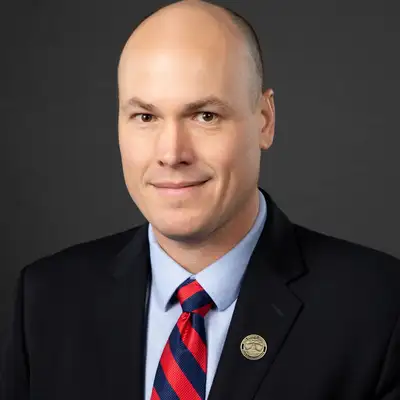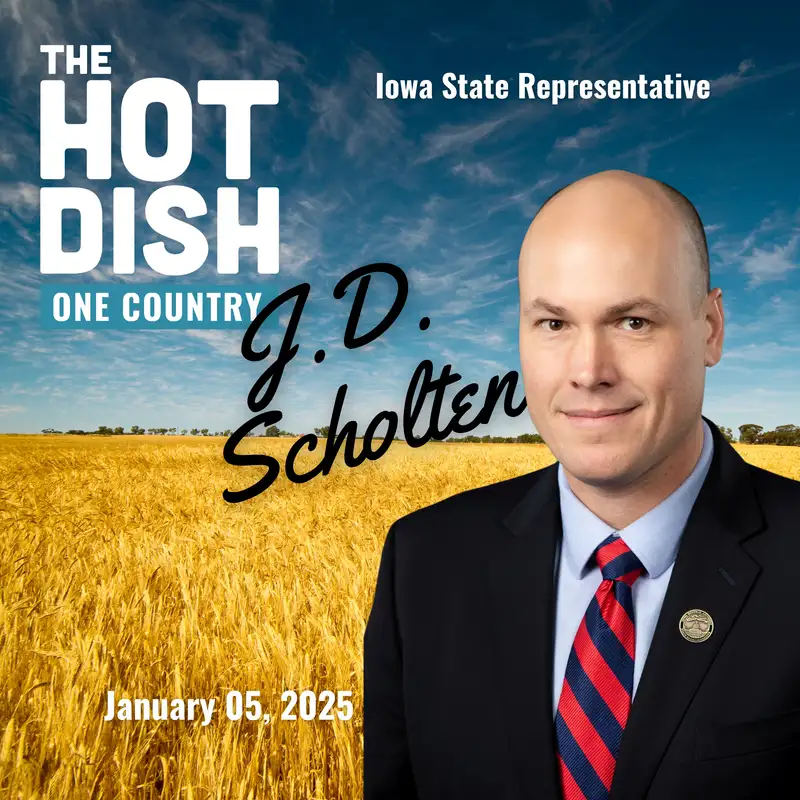Balancing Voter Interests: Split-Ticket Voting in Rural America
Heidi Heitkamp [00:00:04]:
Hey, this is Heidi Heitkamp. Welcome back to the Hot Dish Comfort Food for Middle America.
Heidi Heitkamp [00:00:09]:
And I'm Joel Heitkamp. It's our first episode of 2025. So, Heid, you know, how was the last few weeks break for you? Did you get anything done at all?
Heidi Heitkamp [00:00:19]:
Well, other than, you know, watching you cheat at Hearts, it was all pretty good.
Heidi Heitkamp [00:00:24]:
Still pouting a little bit, huh? Still kind of pulled a fast one on you there in the end. Are you still. A little bit. Sorry. By the way, Hearts is a card game, ladies and gentlemen, just so you know.
Heidi Heitkamp [00:00:36]:
Oh, yeah. You weren't cheating on your wife.
J.D. Scholten [00:00:40]:
Yeah. I tell you, Joel is slippery.
Heidi Heitkamp [00:00:43]:
He is slippery. Although I have to admit, you did not cheat, Joel. You did not cheat.
Heidi Heitkamp [00:00:49]:
But I sure made a lot of people's bottom lips stick on.
J.D. Scholten [00:00:53]:
Oh, my God.
Heidi Heitkamp [00:00:54]:
Melanie won't get over it for a long time, Joel.
Heidi Heitkamp [00:00:57]:
Yeah, there's no doubt about that.
J.D. Scholten [00:00:59]:
I just had a run of bad luck.
Heidi Heitkamp [00:01:00]:
So how was your holiday?
Heidi Heitkamp [00:01:02]:
Oh, my holiday was good. My holiday was. I'll be honest with you, I don't like how this Christmas laid out. It was the latest Thanksgiving you can possibly have, which means it's a short time before Christmas, and then Christmas was in the middle of the week, so it's on a Wednesday. So I like Christmas on a. On a Monday, Tuesday. So you can take a long weekend, but in this one, you work leading up to it. You work right after it.
Heidi Heitkamp [00:01:27]:
So. So if that sounds pouty, you know exactly what I'm getting at.
Heidi Heitkamp [00:01:31]:
And if you're like our family, they come on Sunday and don't leave until the following Sunday.
Heidi Heitkamp [00:01:37]:
Well, there is that. Is there not?
Heidi Heitkamp [00:01:40]:
Listen, I think there was a lot of despondent Democrats, and then this whole thing happened with the budget problems at the end of last year as they were trying to wrap up and do the cr. And it showed some cracks in the Republican coalition, and it's going to be interesting. So I think the big topic of conversation, although I think it's just a diversion, is this whole idea of Elon Musk and the work visas versus all the really conservative people like Steve Bannon saying, look, you don't need those. There's plenty of American workers. And so you're already seeing some cracks in the facade.
Heidi Heitkamp [00:02:21]:
Do you think Elon Musk is as smart as everybody makes him out to be politically?
Heidi Heitkamp [00:02:27]:
Oh, politically, no. I mean, he went all in on Trump because he was mad at Biden and also believed that Trump was probably more capable of being manipulated into his way of thinking on kind of tech issues. I don't think that Elon Musk has a bone of altruism in his body, but I think the fascinating thing, and Joel, I don't ever criticize dosh Department of Government efficiency. We need government efficiency. Let's see what they come up with. But what he found out, what Elon Musk found out during that whole kind of sideshow on the cr, is that there are a lot of sacred cows in a budget, and a lot of them feed Trump's constituency, whether it's rural America or whether it is people who live on the edge day to day. And I think it's going to be interesting to see what he comes up with for $2 trillion worth of budget savings.
Heidi Heitkamp [00:03:28]:
Well, this is the hot dish comfort food for middle America. So we know what it's like to live in the middle of this country. And, you know, it's gotten very, very red. Everybody knows that. And, you know, so you've got Elon Musk, who's supposed to be looking at how to reduce the deficit, how to reduce government spending. And over the last week, I've visited with a number of farmers who never thought that those checks were going to come after the first of the year here. They're coming after the first of the year here. Some of the people that I live right next to are about to get huge government checks.
Heidi Heitkamp [00:04:03]:
And in the words of one farmer, he doesn't need it, but he's sure going to take it.
Heidi Heitkamp [00:04:10]:
Yeah, well, I mean, that's the whole thing. And when you look at where the savings, you know, where in the budget you have any kind of flexibility, you really don't in Social Security, you got to change the law. You really don't in Medicare and Medicaid. So those are two big, big ticket items, including the healthcare item. And you know, he's going to, he's going to find out early, early on that simply cutting the, the workforce 50% won't give him the kinds of savings he thinks it's going to give him. Plus, you know, think about this, Joel. How many farmers would complain if the FSA county office was closed tomorrow?
Heidi Heitkamp [00:04:54]:
Well, let me, let me ask you this. I was with you in the first Trump administration when Steve Bannon and Donald Trump had you come to Trump Tower. I was just across the street. Imagine this in a little pub, waiting for the meeting to get done. But the Steve Bannon that you met then, that you worked around because you turned down the cabinet position, they asked you that Steve Bannon do You really see him now in what I think is a more, what I thought would be a stronger position, really yielding power to an Elon Musk.
Heidi Heitkamp [00:05:28]:
No. And Steve Bannon is a true believer. He is a right wing populist.
J.D. Scholten [00:05:34]:
Guess what?
Heidi Heitkamp [00:05:35]:
Elon Musk is not a right wing populist. And so that right wing populism that they now believe, people like Steve Bannon and Laura Loomer believe that Trump basically got a mandate to pursue those policies.
J.D. Scholten [00:05:51]:
Guess what?
Heidi Heitkamp [00:05:52]:
I don't think it's, I don't think they're going to be that popular with the MAGA crowd. And I think that this is going to be painful when you look at what the budget priorities are. Now, let's just admit there's plenty of Republican support, both in Republican populism and traditional Republican to basically cut taxes or at least extend the 17 tax bill. It's going to be interesting because that's a big ticket item. And Trump knew that there was big trouble ahead on the debt limit. And that's why he wanted either the elimination of the debt limit or an expansion or extension of the debt limit through at least the first couple years of his presidency. He didn't get that. And that was the big surprise to me, Joel, that he lost 35 votes of Republicans who said, yeah, we're with you, but we're not with you on the debt limit.
Heidi Heitkamp [00:06:49]:
So do you think that the House Republicans, with that very slim majority they have, do you think they can govern.
Heidi Heitkamp [00:06:57]:
The last two years when they had a majority, they weren't governing very well. The question is whether, whether they'll pick up more steam or support with Donald Trump in the presidency. And it's always easy to rattle cages and sabers when you're a minority. When the president isn't of your party, it's going to be a little harder for them to bolt on a Republican agenda. But if, if Trump comes back and says, I want you to extend the debt limit without any cuts in spending, you'll get the same 35 people saying, no.
Heidi Heitkamp [00:07:30]:
You and I had a conversation and the conversation was about the fact that the Democratic Party you and I grew up with, joined, have been active in, was the Democratic Party that connected with the men and women that are on the line in Gwynner, North Dakota today building bobcats. You know, that that working class individual that you know draws a decent wage, their dream is to own a $50,000 fishing boat kind of folks. And Democrats don't connect with them anymore. They don't, they don't get their vote anymore. Tell me why.
Heidi Heitkamp [00:08:03]:
Well, I think it's interesting because if you go back, it's kind of like farmers. We got a lot of small farmer vote. We got a lot of big farmer vote. When the Republicans opposed the farm bill, they don't oppose the farm bill anymore. They're one of the great champions of the farm bill. So when you look at Medicare and Medicaid and Social Security, when the president says we're not going to cut those.
J.D. Scholten [00:08:25]:
So kind of that old mantra of.
Heidi Heitkamp [00:08:27]:
The Democratic Party, we're here to create a safety net so that you have some support in your old age, you have healthcare in your old age, or you have farm price support that you'll need to get through some tough times. And so all of that spending has been adopted by the Republican Party. They're no longer the party of fiscal conservative, you know, cutting budgets at which ironically, Jimmy Carter was, which is kind of funny anyway, they're not that party anymore. And so I think that the people where we live, with where we live, Joel, are like, oh, well, you know, I've got all these things guaranteed. I'm going to go with people who, who maybe culturally I align with a little bit more.
Heidi Heitkamp [00:09:14]:
Well, and I've been saying that for a long time, that one of the reasons I got elected in a Republican district for 14 years and the reason I got elected to serve 14 years worth of time in the North Dakota State Senate was because there was work to do. I had to fix workers comp. I had to fix family leave. I had to make sure that those workers I just described were treated with respect and dignity and stuck up for. We won a lot of those things, you know, I got done. And so now they don't look for the same needs. And it's one of the reasons I brought up farmers in the beginning of this, Heidi, because they don't really pay a price if they vote the other way than what they used to. In fact, some might say they gain.
Heidi Heitkamp [00:09:59]:
And so you can't blame them for it.
Heidi Heitkamp [00:10:01]:
Yeah, yeah. It always irritates me when people say, why do they vote against their interest? I say, nobody votes against their interest. You just haven't defined what their interest is. I mean, you're not keeping up with the times. And I think that the Democratic Party has a lot to say about daycare. What was in that bill that Elon Musk tanked was stuff for pediatric research, which actually the Senate ended up doing anyway, wasn't in the bill. There was, there was a lot in there for daycare that Patty Murray and Susan Collins had negotiated.
Heidi Heitkamp [00:10:36]:
There was a lot of stuff in that bill that there was a lot of support for. And, you know, he basically said, this is for full of bloat and pork. Well, that the Congress opened themselves up by giving themselves a raise. And so you could always point at that as for a reason to oppose that negotiated seal. But I think it's going to be incredibly tough for the Republicans to kind of define themselves as a party of fiscal responsibility. And so that's what I'm looking for. And Trump already admitted he's not going to lower grocery prices. He ran on grocery prices, that he promptly said, oh, well, forget that.
Heidi Heitkamp [00:11:15]:
I can't lower them.
Heidi Heitkamp [00:11:17]:
Well, okay, so let me ask you this question. Elon Musk took over Twitter, bought Twitter, turned it into X. Right. First thing he did was can a bunch of people. You know, he said, it's bloated. It's. We don't need that many people. You know what? There's still an X.
Heidi Heitkamp [00:11:33]:
It's still running. We can talk about quality. You know, in terms of. From a political standpoint, he's using it as a political tool. I'm about to get out of it. But the truth of the matter is, for it to be where it's at today, it must have been full of fat. It must have been, you know, the place where you could cut.
Heidi Heitkamp [00:11:53]:
Yeah. The truth of it is also the visas that he's been talking about, you know, that Steve Bannon said, look, there's plenty of people to do those jobs in the United States. If you look at the number of graduates that we have who are software engineers who can't find a job, that's because people like Elon Musk like going to these visas because he basically can hold the workforce hostage. If you don't do what he says, you're fired, and you got to go back to India or go back to wherever you came from. And so he's playing the ultimate I want a workforce that's beholden to me, that I don't have to pay.
J.D. Scholten [00:12:29]:
We'll see how that shakes out when.
Heidi Heitkamp [00:12:30]:
He's talking about the federal workforce.
Heidi Heitkamp [00:12:32]:
Okay, so let me ask you a tough question. You know, I'm a Gretchen Whitmer fan. I'm a groupie. They haven't got her autograph yet, but I think the world of her. But would the Democratic Party be making a mistake from what it's learned in the past about whether or not the nation is ready for a woman president?
Heidi Heitkamp [00:12:54]:
Boy, it's hard to know Joel, I think that if you overanalyze this last election as a response to running a minority woman, I think you've missed kind of the message, which is that we never really had a de facto economic message in the Democratic Party one. And you can't build that within 100 days of the election. And so I really fault and I know it's not popular to say this, but I really fault Joe Biden. Not because he didn't get out earlier, but he never responded to the concerns about inflation the way he needed to respond. In fact, he named the economy after himself. Bidenomics. I'm like, who does that? I mean, if I've got a product no one wants to buy, I don't want my name on it. And no one wanted to buy his economy.
Heidi Heitkamp [00:13:43]:
They wanted to live his economy, but.
J.D. Scholten [00:13:45]:
They didn't want to support it.
Heidi Heitkamp [00:13:47]:
Well, and I would argue that the worst thing he did was and Democrats did. Myself as a talk show host, we didn't explain it. I had a file of Steve Ratner's charts which showed that Biden nomics worked, that Biden nomics was working, that the America was America wasn't in tough shape fiscally. I mean, airports are full, cruise lines are full. Go to Vegas, it's full. It isn't as though we're living this terrible life because we got to pay a little more for a carton of eggs. But Democrats couldn't sell it. Heidi?
Heidi Heitkamp [00:14:24]:
Yep. It's interesting because there still is a huge percentage of people in this country, Joel, who couldn't withstand a $500 hit to their budget. And the one thing that we haven't talked about that creates enormous insecurity is the run up of large credit card debt with huge, huge fees and interest. And, you know, that's not getting any better. Oh, by the way, I have to confess something. I was watching Josh Hawley talk to the presidents of MasterCard and Visa, and I would suggest you all Google that, because not a big Josh Hawley fan from Missouri, but man, he was good in that interview. I mean, he was on the Banking Committee and just absolutely took him apart. And those are the kinds of things that Democrats should be on.
Heidi Heitkamp [00:15:13]:
And you can't cede that space to the Republican Party. I mean, but he's talking about how they overcharge retailers for exchange fees. You know, Visa and MasterCard, they both admitted that they almost make 50% profit on their fees. Can you imagine 50% profit? I mean, if farmers could make that or any small business could operate at a 50% margin be a pretty sweet deal. And, you know, he said, so you aren't going to go broke if we cap these fees. And so it'll be interesting. Elizabeth Warren is now ranking on banking. Ranking on banking.
Heidi Heitkamp [00:15:50]:
That's. That rhymes. Anyway, she's ranking on banking, and I think she's going to be doing a lot of stuff that, that is populist, maybe approach it from the left wing and dare these folks to say no.
Heidi Heitkamp [00:16:06]:
I will tell you this. The one good thing that happened in 2024 that I loved was you finally joined a club that I've been in for 13 years. You became a grandmother. And so congratulations to you. It was time your beautiful daughter put a smile on you and Darwin's face. And thank God that gorgeous little guy looks like Darwin.
Heidi Heitkamp [00:16:30]:
He looks like his daddy. But you know what? He has learned how to open pretty much any gate. And he's not 1 years old. So I figure he's headed for the engineering world. Joel?
Heidi Heitkamp [00:16:44]:
Well, as you'll find out as a grandparent, everything you figure is going to end up wrong.
Heidi Heitkamp [00:16:53]:
Well, listen, Joel, I mean, it's always great. We're going to have a whole lot more to talk about as the Trump administration kind of pans out and we see what those priorities are.
Heidi Heitkamp [00:17:05]:
Yep. And now we have some returning guests to play catch up with. Heidi?
Heidi Heitkamp [00:17:09]:
Yeah, that's right.
Heidi Heitkamp [00:17:10]:
I spoke with J.D.
Heidi Heitkamp [00:17:11]:
Scholten, the State Representative of Iowa, about voter priorities in his mostly rural Ruby Red state. It was a great conversation.
Heidi Heitkamp [00:17:25]:
I am really excited to talk to one of One Country's founding board members, J.D. Scholten. J.D. hey, you survived the election. A Democrat in, in rural Iowa.
Heidi Heitkamp [00:17:39]:
Woo.
Heidi Heitkamp [00:17:40]:
How did you do it?
J.D. Scholten [00:17:41]:
Oh, man. Well, Trump won my district.
Heidi Heitkamp [00:17:43]:
I know much.
J.D. Scholten [00:17:44]:
He won 50/48. And so I ended up winning by seven. But I think it's a combination of few things. But at the end of the day for state House races, it's about how much you door knock, how much you get out there to the voters and how much they trust you. And so being the incumbent, I, I think that gets a little bit of a bump. Having played professional baseball and representing Sioux City this summer helped as well. But at the end of the day, it's those door knocks and constituent services and all that adds up to outperforming the top of the ticket.
Heidi Heitkamp [00:18:14]:
What's the big issue in your campaign? What did your opponent talk about? What did you talk about?
J.D. Scholten [00:18:19]:
My opponent didn't really talk about anything. Is like if you just had a blank slate with an R by Your name. That was pretty much my opponent. I'm not trying to diss him or anything, but he didn't. He's a third grade teacher who couldn't answer how he felt about vouchers, which was one of the biggest bills that was passed in the past couple of years. And so a lot of just economic issues, that is the number one thing that came up on the doors was the cost of living and public education. Those were the two big things that, that I heard on the doors.
Heidi Heitkamp [00:18:50]:
What did people say about public education.
J.D. Scholten [00:18:53]:
In the state of Iowa, we passed vouchers, Republicans passed vouchers, I'll say. And then the other thing was the AEA bill, which our area education agencies, those are the things that are broken into regions to help public education. Well, they help all the education. They help private schools as well. So like when I went in kindergarten, I went to Immaculate Conception at Catholic school. But I, through the aea, I had a speech issue and they helped me get my speech up to my age level appropriateness. And I'm always, I was very grateful for them. And that was something.
J.D. Scholten [00:19:28]:
This time last year, before the legislation legislative session even started, nobody was talking about this. And then the governor at her condition of the state speech, all of a sudden dropped this. And the very next day she had a 270 page bill issuing of what she wanted to do and, and pretty much just dismantle a lot of the aeas and take the money away from them and give it to school districts. And so like a school district like Sioux City could probably manage with stuff like this, but these smaller schools, especially the rural schools, they can't, they can't afford to have a special therapist or a special this and that. And at the end of the day, like, that's why we have these regionals. That's why this was set up to help to make sure that there's equity in our education. And this just goes against a lot of what Iowa has stood for decades.
Heidi Heitkamp [00:20:17]:
What's going to be interesting as we take a look at the transition in this administration and the policies that are going to come out of the Department of Education, number one, the promise to eliminate it. But what people really don't understand is the two big functions of the United States Department of Education is what we call Title 1 funding, which helps school districts manage special needs students. The exact same thing you're talking about. Well, one school district, Wymere, had three or four special need students. If they had to front that just in the Wymere school district in North Dakota, they couldn't afford those students. Since this is a way to equalize the needs of special need children across states and across the federal government. And it's going to be interesting, I think, to see how they manage the Title 1 funding and the other big piece of Department of Education is student loans. It's going to be interesting to see how education might find its way to the front of the issues for a lot of people out there, especially a lot of us in rural America.
J.D. Scholten [00:21:23]:
I think the two big things that I see, I, I guess there's the three things, if you add the tariffs, but it's the education, like you mentioned, I think it's the postal service, because that's coming up again. They want to privatize it. And then the third thing I think is the tariffs and what we do with trade in rural communities, I think that's going to be largely impacted by then.
Heidi Heitkamp [00:21:43]:
These are really tough issues. And so I'm waiting to see what Doge, the made up oversight organization that Trump has put Elon Musk and Vivek Ramaswamy in charge of, what their recommendations are. These are two people who have really no background in government funding, why these programs exist. And I'm here to tell you, I think good on them. Take a look, but don't assume you know everything. And it's gonna be interesting because these are two people who pretty much assume they know everything. And I'm very collaborative people.
J.D. Scholten [00:22:20]:
Well, it's been interesting to follow Elon on his social media in the sense that, not that I'm a huge fan by any means, but he's finding out in real time what some of the government does and some of these agencies does. And, and it's. There was one tweet he had about knowing that the US Pays the most per person for health care. And yet, like, it's not. Things aren't going very well. Like, yeah, Democrats have been saying that for years, saying we're not getting a very good bang for our buck.
Heidi Heitkamp [00:22:52]:
I want to turn to a topic that is not unique to Iowa, but certainly involves Iowa, and that's the president elect, Former President Trump suing the Des Moines Register and their pollster. On what grounds? I'm not sure. I was teasing my husband last night when I was running for the Senate won that race. The Fargo Forum, which was the largest newspaper in North Dakota, published a poll that had me down seven points. I guess I missed my chance to sue them.
J.D. Scholten [00:23:26]:
Is the statute of limitations over.
Heidi Heitkamp [00:23:28]:
What's interesting about all of that is it is Just one thing that's going to happen. There's tons of lawsuits right now against the New York Times. I think, full disclosure, ABC is one of my employers. I'm a commentator for abc. They settled. That's causing a lot of discontent in the ranks. And I think sends absolutely the wrong message to people who want to bully the press. And so is there anything the Iowa legislature can do to stop this?
J.D. Scholten [00:24:01]:
I would say because there's a Republican majority, I think they're gonna side on Trump on this. The, the reality is that the Republicans in this state don't go through traditional media anymore. They can get their message out so quick. And I think that's something that, that Democrats are at a massive disadvantage. An example of this. But when protests were happening on college campuses in the spring, when Harvard had theirs the very next morning on our local conservative radio station, they were already putting the conservative slant on these protests. And I just, I was just shocked at how fast, like how electric their messaging can go to voters and just go trickle down. And we just don't have that comparison on our side.
Heidi Heitkamp [00:24:53]:
And I'll, I'll say this. I think it's because of the arrogance of the Democratic Party. I think it's, I said it once, everybody knows. And if Joel were on, he'd say, yeah, and those conservative talk shows would then have somebody on who was high profile on that issue. Democrats are like, we don't need to talk about that. No one believes that. A lie goes around the world seven times if you don't nip it in the bud. And to me, the rapid response in this campaign, the unwillingness to engage on tough issues like immigration and inflation, I think it costs the Democrats and it costs the Democrats up and down the ballot.
Heidi Heitkamp [00:25:30]:
Although let's look at split ticket voting. You're an example of that. Split ticket voting is alive and well in Wisconsin. Tammy Baldwin was able to win despite a victory by Trump. Same is true in Michigan with Elise Slotkin. There's great examples of where Democrats were able to win despite Trump carrying their district. And I think that that tells us that, that there is an opportunity at the margins if the message is right. So let's talk about that rural message.
Heidi Heitkamp [00:26:01]:
I think you outlined the three things that I would talk about. I would add healthcare in there, you know, which is, it's on life support, literally in rural America. And I think about, especially first responders, what does that look like in rural America?
J.D. Scholten [00:26:16]:
And one thing that's, I'm sure happening in North Dakota as much as it is in Iowa, we're having a nursing home crisis. All of healthcare is impacted. We're having an OBGYN crisis here in the state. We have towns of 5,000 people that people there have to travel over an hour just to get basic care. And like, how do you grow a community that's in Iowa. Yeah. So there's some major issues, and that's what we keep on saying down at the Iowa state legislature. We have huge issues that we're just not dealing with.
J.D. Scholten [00:26:48]:
And the legislator would rather do punch down politics. They'd rather talk about transgender kids in, in athletics. And in fact, there, the last couple years, there's more bills to limit transgender athletes in the state of Iowa than there are transgender athletes in the state of Iowa. And that just shows you where their priorities are at. And, well, it works, right? Well, unfortunately, it works. Yeah. One of the things on the Democratic side, you just across the nation, rural voters are 20% of voters. And you look at, okay, on the Democratic side, how much do we invest into that? Is it 20%? And it's nowhere near that.
J.D. Scholten [00:27:25]:
And that's, I think, ultimately one of the big problems. And then you look at the Senate map, is it expanding? By all means, it is not expanding for Democrats. It's shrinking. So, like, the path that we're going on is not, not a winning message, not winning pathway, not winning electorally. And so, like, why are we continuing to go on this path? And so that's one of the many things I'm really trying to look at is, okay, how can we make a state like Iowa that they're like, it went, Obama, Obama, Trump, Trump, Trump. And how can we get it back into the, the right direction? And so if we were doing everything right and losing, that's one thing. But to me, like, there's so much on the table that, that we can be doing. And that's a lot of the discussion.
J.D. Scholten [00:28:16]:
We just had our caucus for the Iowa House Democrats talking about what we should be doing, where we should be doing it. I think there's just so much opportunity for Democrats, but we just got to change the mindset of a lot of this. And I'm sick and tired of listening to folks who live out on the coast telling us what to do here when we're doing the work. And it just, there just doesn't seem much of a Democratic way of doing things when it comes to our party right now.
Heidi Heitkamp [00:28:44]:
A former colleague of mine was doing a presentation at the Senate caucus and on rural votes and sent me a note and said, okay, what's your advice. And my last bit of advice is, number one, respect the people who are out here who have been doing this work, which is where I want to close. How do people stay optimistic, J.D. how do you stay in the fight? Because a lot of people, they're just volunteers. They just believe that they have a duty to present a different version of what government needs to do. They believe in public education, think it's threatened. They don't think we should be picking on kids regardless of if you get your jollies and you win elections by picking on kids, there's something wrong with you. And so they have values and they want those values to be reflected in their politics.
Heidi Heitkamp [00:29:34]:
But, man, is it hard.
J.D. Scholten [00:29:36]:
Oh, it's incredibly hard right now. But the best advice I ever got was from a Native American activist who lived across the river from me in, in South Sioux City, Nebraska. And when I decided to run For Congress in 2018, he knew Steve King and he knew the challenge I had in that race in a district Trump won by 27. And he goes, JD if you want change, you have to get uncomfortable. And once you get uncomfortable, you have to get others uncomfortable. And so for the last, it's been four election cycles now, I've been uncomfortable. I want change. And I.
J.D. Scholten [00:30:08]:
But my problem is trying to convince more people that we need change. And so one of the things that keeps me optimistic right before the election, I had a friend's wife reach out to me to say, hey, she has this book club. She. It's a bunch of people who are Democrats who want to, they don't really understand what's going on. Could, could I just talk to them? And so what started off as a book club, I went to the thing and it was just on my calendar. I had no idea what to expect. But it ended up being 24 women who are upset about what's happening. They organically created this own group in Sioux City.
J.D. Scholten [00:30:49]:
I've been involved in politics here for eight years, four cycles I mentioned, and I only knew probably three or four of the women. And so there, there are groups that going to come out. And I just, I hope we have the enthusiasm we did in 2018, because I think 2026 is going to be a very important year for Democrats and for our country going forward.
Heidi Heitkamp [00:31:12]:
It's only going to work if Democrats realize that they need to be speaking to the entire country and that they need to defend what they're doing. Criticize, yes. But also explain why you're doing what you're doing.
J.D. Scholten [00:31:26]:
Exactly. And so if we're going to be the party of being inclusive. Let's include rural, let's include Iowa, let's include North Dakota. And that to me, here's my biggest concern about what's happening in Iowa is right now, for the second cycle in a row, all four congressional members and the two Senate are all Republicans. Our governor is Republican. In both chambers in the state level are Republicans. I'm worried about the young talent that we're losing that decide not to get into politics because there's no office to work for here. You look at Obama, how a lot of his initial workers and staff, they came from Dashiell, from South Dakota.
J.D. Scholten [00:32:10]:
And so that's one of my big concerns. We got to find a way to get these young folks involved. I hope the new DNC chair views that a huge potential problem that we're also having so we can build the bench and build for stronger things coming up in the future. But that's another concern I have.
Heidi Heitkamp [00:32:27]:
Yeah.
Heidi Heitkamp [00:32:27]:
Well, J.D.
Heidi Heitkamp [00:32:28]:
Congratulations on a victory. I look forward to watching the advancement. I know many of the talented Democrats in the Iowa legislature. You guys punch above your weight. You can be a bellwether for messaging to the Democratic Party, picking your fights, the right fights, and sticking to your guns on things like making sure every kid gets equal education opportunity. Those are long term New Deal Democratic values that we think define our party. But in the meantime, I hope you had a wonderful holiday. We'll see how the inaugural turns out and see how your legislature gets launched.
Heidi Heitkamp [00:33:08]:
But really so grateful for your giving your talents to one country. So grateful for you giving your talents to the state of Iowa and hopefully eventually to the folks of Iowa and Washington, D.C.
J.D. Scholten [00:33:22]:
Thank you, Heidi. Always a pleasure.
Heidi Heitkamp [00:33:25]:
Thank you, Joel. And thank you listeners for joining us. We want to hear from you, so please email us your questions and your suggestions. Our address is podcast@onecountryproject.org the Hot Dish.
Heidi Heitkamp [00:33:39]:
Is brought to you by the One Country Project. Learn more@onecountryproject.org that's one countryproject.org.
Heidi Heitkamp [00:33:48]:
And we'll be back in two weeks with more Hot Dish, comfort food for Middle America.
Creators and Guests







